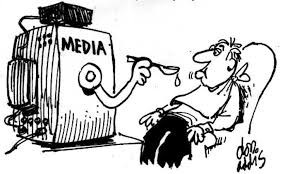Media and the power

A brief conceptual analysis is needed in order to specify what notions of power are involved in such an approach to the role of the news media. I limit this analysis to properties of social or institutional power and ignore the more idiosyncratic dimensions of personal influence, for example, those of individual journalists. Thus, social power here will be summarily defined as a social relation between groups or institutions, involving the control by a (more) powerful group or institution (and its members) of the actions and the minds of (the members) a less powerful group.5 Such power generally presupposes privileged access to socially valued resources, such as force, wealth, income, knowledge, or status. Media power is generally symbolic and persuasive, in the sense that the media primarily have the potential to control to some extent the minds of readers or viewers, but not directly their actions.6 Except in cases of physical, coercive force, the control of action, which is usually the ultimate aim of the exercise of power, is generally indirect, whereas the control of intentions, plans, knowledge, beliefs, or opinions that is, mental representations that monitor overt activities is presupposed. Also, given the presence of other sources of information, and because the media usually lack access to the sanctions that other such as legal or bureaucratic-institutions may apply in cases of noncompliance, mind control by the media can never be complete. On the contrary, psy- chological and sociological evidence suggests that despite the pervasive symbolic power of the media, the audience will generally retain a mini- mum of autonomy and independence, and engage more or less actively, instead of purely passively, in the use of the means of mass communi- cation.7 In other words, whatever the symbolic power of the news media, at least some media users will generally be able to resist such persuasion. This suggests that mind control by the media should be particularly effective when the media users do not realize the nature or the implications of such control and when they change their minds of their own free will, as when they accept news reports as true or journalistic opinions as legitimate or correct. Such an analysis of social power and its symbolic dimensions requires going beyond a narrow social or political approach to power. It also involves a study of the mental repre- sentations, including so-called social cognitions such as attitudes and ideologies, shared by groups of readers or viewers. If we are able to relate more or less explicitly such mental representations, as well as their changes, to properties of news reports, important insights into media power can be gained. Well-known but vague notions such as influ- ence or manipulation may then finally be given a precise meaning.
